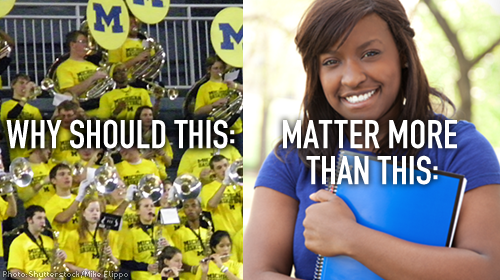
There are many individuals and groups in Michigan who lost as a result of yesterday's United States Supreme Court decision in Schuette v. Coalition to Defend Affirmative Action.
Schuette is widely misunderstood as being a case about affirmative action. It is not. In fact, it leaves in place Supreme Court law recognizing diversity as a compelling governmental interest and permitting carefully constructed affirmative action programs. Today's decision has no effect on states that want to adopt or maintain affirmative action plans.
The policies banned by Proposal 2, a 2006 Michigan ballot initiative that led to a state constitutional ban on race-conscious college admissions policies, were all constitutionally permissible. None involved quotas or singling out race over other factors contributing to a diverse student body. Rather, this case is about civic participation for all. The question is not whether universities in the state must implement race-conscious admissions policies. Only whether those who want to take policies that promote racial diversity into consideration along with other diversity factors – that benefit everyone – can compete on the same playing field as other groups advocating for admissions policies that matter to them.
And that is where the losses come in.
Applicants to schools in Michigan who believed that they should be able to ask schools to consider race as one factor in their admission lost.
Even though other students that had alumni parents or grandparents or relatives that made large donations to the school can continue to argue that family giving should be considered in the admissions policy.
Potential students who hail from Buford, Wyo., or other geographically isolated locations will likewise continue to have the opportunity to say that factor should be considered for admission to Michigan universities.
University officials who, following the instruction of the Supreme Court, decided that diversity served important educational interests and put together carefully crafted programs to ensure diversity existed lost.
Students who valued the opportunity to learn in the rich educational environment created by real diversity and sought to be prepared to live in a diverse business and social world lost.
Citizens who believed that educational institutions should reflect the diversity of their state and prepare all of its citizens to assume leadership roles in their state lost.
And, in a very real sense, everyone including those of us outside of Michigan lost as the Supreme Court placed one more obstacle in the path of people seeking, as Justice Sotomayor so movingly put it, "to participate meaningfully and equally in self-government."
Fortunately, these losses are confined to the relatively few states that have enacted total bans on consideration of race in governmental decision making. Today's case is an opportunity for those states to reassess those bans, to take note of the dramatic loss of qualified students of color in their schools and the resulting loss of diversity, and to consider repealing the ill-considered bans.
While a setback for Michigan, affirmative action remains alive and well in many other places across the country. For the states that still allow affirmative action policies, today is an important reminder that although the Supreme Court did not go so far as international law which requires the use of fair consideration of race, it does clearly permit it.
Instead of supporting initiatives that rig the game against people who were traditionally excluded, those states should take every step to enact practices which further the diversity which benefits us all.
Learn more about affirmative action and other civil liberty issues: Sign up for breaking news alerts, , and .

